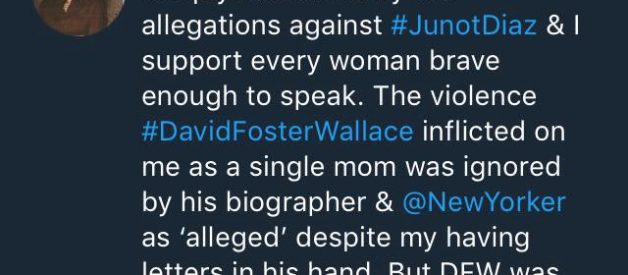Junot Daz?s accusers are being heard. But the literary world has far worse skeletons in its closet.
TW: Sexual assault, domestic violence, abuse
On May 4th, Junot Daz began being publicly accused of assaulting and harassing women at literary events and in his private relationships. This article on Book Riot covers the basics, but there are many more women sharing about their encounters with Daz under the #JunotDiaz tag on Twitter.
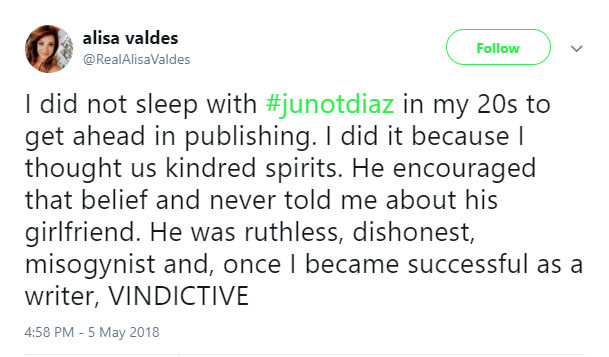
These accusations come on the heels of Junot Daz writing a truly bracing and self-reflective essay for the New Yorker about his own experience as a sexual assault victim. In the piece, Daz implies that his own history of abuse (and his repression of it) led, in part, to his inability to form respectful romantic and sexual bonds with women for many years.
For the most part, it seems, Daz?s accusers are being taken seriously. This is notably unlike how many people in the literary world responded to other, past accusations of abuse, including very well verified ones like those against David Foster Wallace. That Daz is a man of color and Wallace was a white, wealthy son of academics is obviously relevant. And to highlight this, Wallace?s most outspoken and best-known accuser, the fantastic writer Mary Karr, has come forward again to remind us of her deceased ex?s actions.
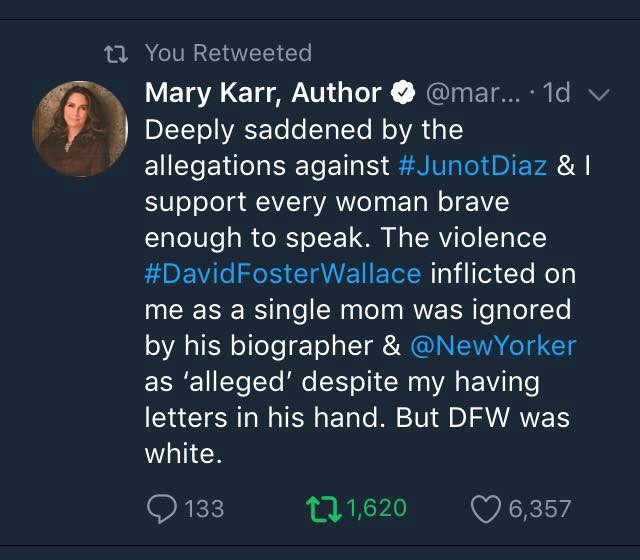
? ? ? ?
A lot of the people now being publicly accused of assault, rape, and harassment are white men. But the majority of the people actually meeting consequences for their behavior are men of color. The more an abuser?s existence challenges stereotypical narratives of brown and black men as predators and white women as prey, the less likely the abuser is to be fully punished for their actions.
In the #MeToo world, white, female singer Melanie Martinez can be accused of rape and get off scott-free, and white male harassers like Charlie Rose and Harvey Weinstein can disappear briefly, receive some therapy, then come back to opine about what they?ve learned. Some readers, many of them white, will now discard the writing of Junot Daz, but will continue to consume David Foster Wallace?s overwrought, garbled narratives of misogyny because he was a white dude and he seemed so goddamned tortured about it all.
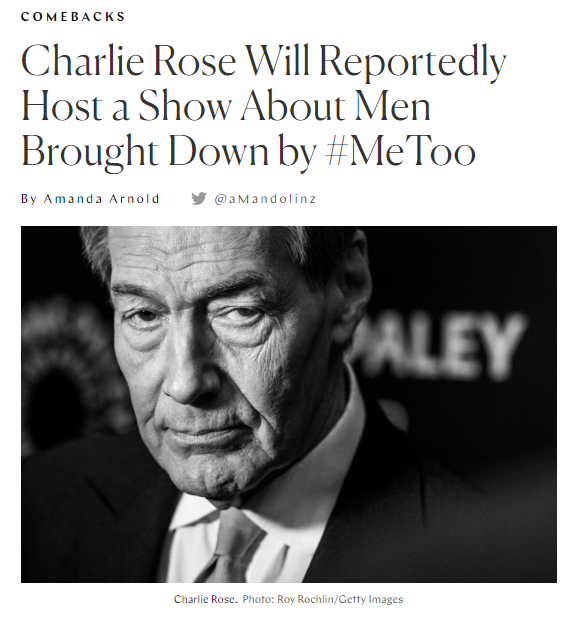
The #MeToo movement might make a lot of us feel heard and protected, but we cannot rest easy. We have to actively fight against the biases that color who pays the price for their behavior and whose abuse is ignored. Yes, Daz deserves consequences for his actions. Yes, his accusers ? many of them Latinx women ? need to be heard. But some of our certainty and fury must be directed at white abusers as well. David Foster Wallace was never a good man. This has been known for a long time. Yet most people have never heard about it. That has to end, now.
? ? ? ?
I?m a recovered David Foster Wallace fan. I loved Infinite Jest, I?m still deeply moved by about half of Girl with Curious Hair, and I still find many interviews with him thought-provoking and transfixing. But it?s been clear to me, for many years now, that DFW was not the contemplative, troubled-yet-altruistic soul that everyone who quotes This is Water wants to paint him as. He was an abusive, explosive man who cashed in on his guilt over his own misdeeds.
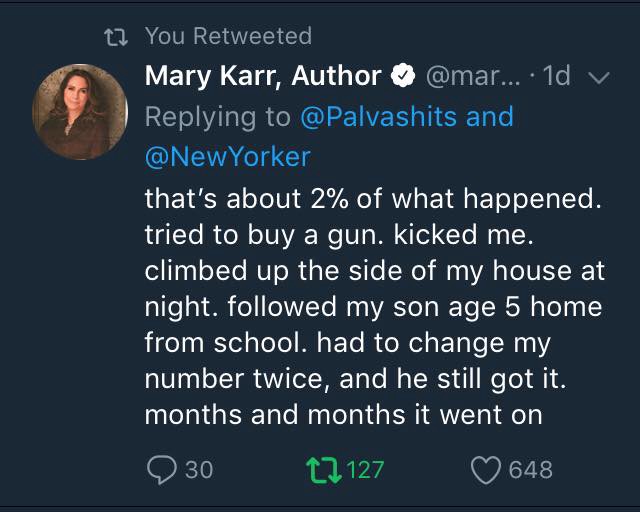
I got into DFW?s work during a particularly dreary winter depression back in 2010. His words climbed down into the pit with me and kept me company when I most wanted to die. I adored him for a couple years afterward. I read everything he had ever created, tracked down obscure, old interviews and radio segments on him from the early days of the internet. When I ran out of his own work, I read books that were tangentially about him ? including Mary Karr?s Lit and The Marriage Plot by Jeffrey Eugenides.
Eventually, my love of DFW destroyed my idolization of him. The more I read of his personal history, the more clear it became that he was an abusive piece of shit and a hypocrite. Here are some of the things that I discovered, back in 2011 and 2012. Many of these details are from Jonathan Franzen?s essay ?Farther Away? and from D.T. Max?s Wallace biography, Every Love Story is Ghost Story. A few other factoids are from the Wallace-L listserv. Some choice details are, of course, from the amazing Mary Karr?s memoirs, which are all infinitely better written that any of DFW?s nonfiction work.
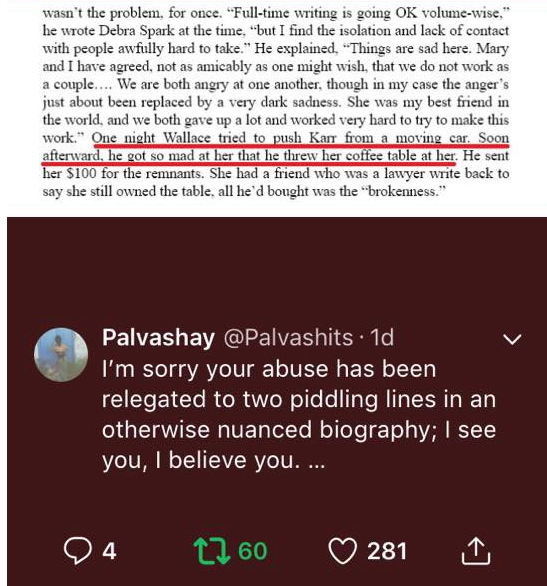 The quoted text is from DT Max?s Every Love Story is a Ghost Story.
The quoted text is from DT Max?s Every Love Story is a Ghost Story.
- Wallace misrepresented dozens of facts in almost all of his nonfiction essays. Many facts are completely stolen from other journalist?s experiences or flat-out made up. For example, in his porn convention essay (in Consider the Lobster) he describes a woman with breast implants that have external valves that allow them to be pumped up or depressed at will. This was a complete fabrication ? such implants did not exist in the 1990?s when he was writing the piece. Many events described in that same essay (in the first-person) were actually related to Wallace by another journalist.
- Other made-up facts: The baton-twirling scene in the essay ?Ticket to the Fair? was completely made up, as was the identity and existence of his companion in that piece.
- Many facts, people, nicknames, and interactions described in?Rise, Simba!? were similarly made up.
- ?Consider the Lobster? was not subversive; Wallace wrote the piece on his own and then sold it to Gourmet, he wasn?t sent to the event by Gourmet as a journalistic enterprise, though he claims as much in the essay.
- His early works (Broom of the System and some of Girl with Curious Hair) cribbed plots and stylistic elements from Pynchon and Delillo. The theft was so overt that Wallace worried about plagiarism suits throughout his career.
Of course, those are just the literary crimes. Here are the acts of outright abuse:
- He pushed the poet and memoirist Mary Karr from a speeding vehicle.
- He threw a coffee table at Karr and shattered it.
- After attempting to pay Karr back for destroying the table he threw at her, he demanded that she give him shards of the table to keep.
- He stalked Karr and punched out her car window.
- He assaulted a student during a creative writing class he was teaching.
- He had sex with his creative writing students and, while on book tour, a 17-year-old.
- He stalked Karr and her five-year-old son, and threatened to shoot Karr?s husband with a gun he?d bought for that express purpose.
After learning all these things about DFW back in 2012 or so, I revisited a lot of his work and found it lacking in the genius and sensitivity that I had remembered. Here are some things I noticed in particular (often with the help of discerning readers on the Wallace-L listerv):
- DFW couldn?t write empathetic female characters to save his life. The antagonistic Avril M. Incandenza of IJ was a highly inflammatory version of his estranged mom, and his tone-deaf portrayal of her caused her great pain.
- The unsympathetic female solipsist of his story ?The Depressed Person? was a fellow author (Elizabeth Wurtzel) he had sex with and developed quick contempt for. This is also true the female lead in the story ?Westward the Course of Empire Takes its Way?.
- His main female trope of obsession was the woman too beautiful to function in the world (first realized as Infinite Jest?s veiled, dangerously beautiful Joelle van Dyne, then re-created in a slightly ditzier form in The Pale King as Meredith Rand). These characters have few outstanding qualities other than their captivating beauty, which is so extreme that it verges on being a curse; The women have no agency in the story or their own lives. Both are likely based on DFW?s lover/recovery partner/stalking victim Mary Karr.)
- Essentially none of his work (except for a short story about a lesbian couple in Girl with Curious Hair) features female characters with agency. They?re nothing but naive victims in Brief Interviews, and colorful bystanders in Broom, IJ, and Oblivion, and The Pale King.
- Women seldom have voices of substance in his nonfiction, either. The one essay where he is joined by a witty, outspoken female companion (?Ticket to the Fair?) has been revealed to be a fiction ? the woman didn?t exist.
? ? ? ?
Learning and observing these things about Wallace radically changed my reading habits. Instead of tracking down and voraciously consuming every piece of half-edited ephemera Wallace ever spit out, I turned my focus on women writers, like Karr, who were generally more concise, self-aware, and controlled in their writing.
I also found comfort in Karr and others? experiences as survivors of abuse ? as it turned out, one of the reasons I was so miserably depressed during the winter of 2010 was that I was in a physically, emotionally, and sexually abusive relationship. It took me a while afterward to realize it. The guy abusing me seemed so sensitive, after all. And he was such an active, curious reader, so keen on philosophizing about human goodness.
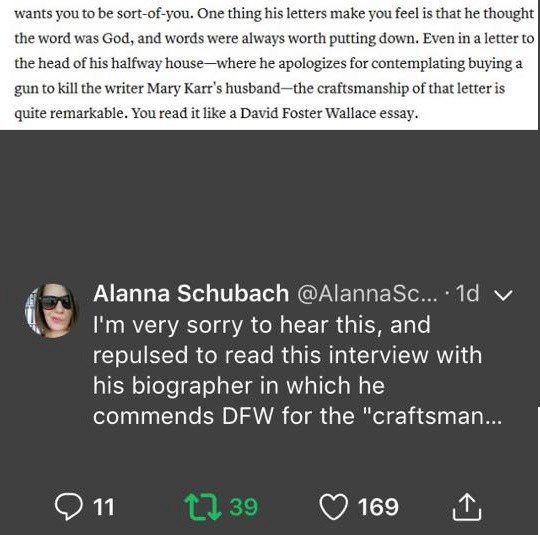 Wallace?s biographer knew about his abuse ? Karr showed him letters in which Wallace admitted to his actions. They were taken as a sign of Wallace?s ?craft?, not his capacity for evil.
Wallace?s biographer knew about his abuse ? Karr showed him letters in which Wallace admitted to his actions. They were taken as a sign of Wallace?s ?craft?, not his capacity for evil.
#MeToo has forced nearly all of us to confront the hateful, abusive actions of people whose work we admire. I think it?s important for us to be capable of holding and acknowledging that troubling contradiction. Mary Karr doesn?t want readers to abandon Wallace?s work ? she?s tweeted as much:
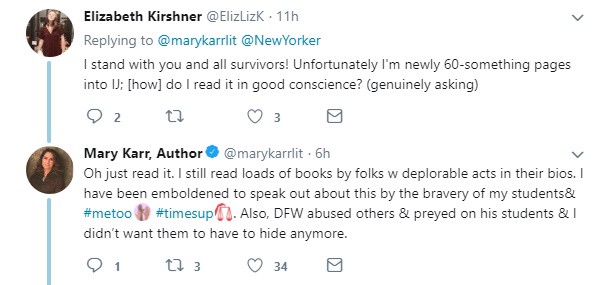
It?s not productive to try and distance ourselves from the lives and work of every human who has proven capable of evil. That leads to an arms-race of self-purification-by-association that will never stop. That seemingly good or complicated people can commit heinous acts is a truth we?re gonna have to confront again and again, if victims are ever gonna feel safe.
We?re gonna have to get good at accepting that, and learning to deal with it. It is the discomfort with that nuance that pushes people to ignore accusers and exalt creators into impunity. It?s the fear of complexity that kept Wallace?s biographers and most of his fans from admitting that the sweet, sad man whose books they loved was also a stalker and would-be murderer.
I loved Wallace?s work, I really did. I really believed he was a complex, hauntingly beautiful soul. Now that I know the truth about him, I find most of his work unimpressive, and I feel grateful that he is dead. If we were still alive, he?d still be abusing students, harassing exes, and tiptoeing around his own capacity for evil in hand-wringing, exhausting pieces of prose. I have no doubt of that. I?m glad to instead live in a world where Mary Karr is thriving and the truth is known. Karr?s books are better anyway.
